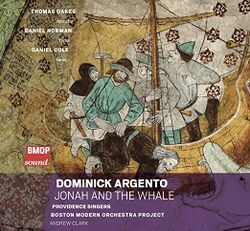Jonah and the Whale (1973 Argento), oratorio
Jonah and the Whale <German> (1973) is an oratorio by Dominick Argento (mus.).
Abstract
"An oratorio for narrator, 2 voices, chorus & orchestra."
Parts/Movements
- Part 1. Chorale. The Lesson
- Part 1. Arietta and Cavatina. The Charge to Jonah
- Part 1. Worksong and Sea Shanty. His Flight
- Part 1. Variation on a Sea Shanty. The Storm at Sea
- Part 1. Intermezzo. In the Belly of the Whale
- Part 1. Aria with Chorus. His Prayer
- Part 2. Ostinato and Kyrie. In Nineveh
- Part 2. Cadenza. Jonah's Despair
- Part 2. Nocturne and Aubade. The Booth
- Part 2. Fugal Aria and Hymn. God's Rebuke
- Part 2. Chorale and Coda. The Lesson Restated
Editions, performances
Jonah and the Whale was commissioned by the Plymouth Congregational Church and the Cathedral Church of St. Mark (Minneapolis, MN) for the choral organization now known as VocalEssence. Jonah and the Whale was completed in 1973 and received its first performance that same year under the direction of Philip Brunelle, founder of VocalEssence.
Sound recording (2010 Clark)
- Thomas Oakes = Narrator
- Daniel Norman = Tenor
- Daniel Cole = Bass
- Providence Singers
- Boston Modern Opera Project
- Andrew Clark = Conductor
"Dominick Argento: Jonah and the Whale" is the second CD in the BMOP/sound catalog representing yet another successful collaboration between the Providence Singers and the Boston Modern Orchestra Project. Inspired by a 15th-century painting found on the ceiling of a church in Härkeberga, Sweden by painter Albertus Pictor, this large-scale oratorio draws upon a variety of sources including the 14th-century poem, "Patience, or Jonah and the Whale," the Vulgate Psalms, a Protestant hymnal, and the King James Bible. With outstanding performances by Thomas Oakes (narrator), Daniel Norman (tenor), and Daniel Cole (bass), conductor Andrew Clark leads the chorus and orchestra with skilled direction."--Publisher description.
Bibliography
- Lisa B. Hanson, Dominick Argento's "Jonah and the Whale": A Study of the Oratorio and Comparison to Representative Twentieth-century Oratorios (UMI, 2002).
"Dominick Argento's musical style has been characterized as "eclectic" because of the diverse compositional techniques he employs, juxtaposing the old with the new. In his vocal works, this eclecticism is dictated by his desire to deliver the text. Argento's preference for vocal composition and communicating text is the impetus for his composition. Jonah and the Whale is exemplary of his style, and the variety of compositional techniques in this oratorio includes chorale, fugue, free serialism, and free tonality. In choosing texts, Argento is again drawn to juxtaposing the old and the new. Jonah and the Whale includes seven different texts spanning seventeen centuries. The majority of the libretto is taken from a fourteenth-century poem, Patience . Other texts include the King James Bible, Kyrie Eleison, the De Profundis, the hymn, "Praise to the Lord," a sea shanty, "Greenland Fishery, " and original verse by Argento. Diverse in its anachronistic juxtaposition of texts and musical settings, the oratorio is bound together by structural elements and a tone row, which is pervasive, but not employed exclusively. Another unifying device in Jonah is the symbolism of "threes, " inspired by a trefoil pattern in a Swedish painting depicting Jonah. The tone row is based on ascending and descending diminished triads. The orchestra is a trio of trios: three trombones, three percussionists, and three keyboards. "Praise to the Lord" is written in 3/4, with three flats, and six-bar phrases. Other forces include SATB chorus, soprano, tenor, and bass soloists, and a narrator. With its diversity of text and musical styles, Jonah and the Whale is not only unique in Argento's choral works, but in the genre of twentieth-century oratorio. Three representative oratorios, The Way of Jesus, by Alan Hovhaness, Golgotha, by Frank Martin, and A Child of Our Time, by Michael Tippett, have been chosen for comparison to Jonah, based on their diversity of compositional techniques, texts, or propensity to Argento's style. Jonah and the Whale is exceptional in its genre, not only in its variety of composition and texts, but in its powerful communication of Jonah's story through both music and verse."--Publisher description.
